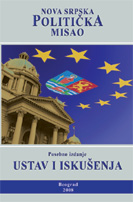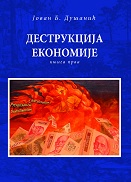| NSPM in English | |||
Britain is still a big player - Europe needs us |
 |
 |
 |
| уторак, 27. октобар 2009. | |
|
(The Times, October 26, 2009)
Our outlook, influence and power today reflects history but does not rest on it. Instead, four factors are key. First, we embrace the internationalism of the modern world, with its new powers and new threats. Britain is a leading contributor of people and money in tackling the great challenges of the world. Our Armed Forces are trained, equipped and flexible. And we are willing to deploy them in the toughest places. Our intelligence services are exceptionally effective — as their involvement in the revelation of secret Iranian nuclear facilities has shown. We are world leaders when it comes to development assistance. And with 261 diplomatic missions in more than 160 countries, our foreign service gives us insight and influence the world over. Government is only part of the story. British businesses export British goods, values and working practices all over the world. Two of the big eight humanitarian charities — Save the Children and Oxfam — started life in Britain. The diversity of our society gives us diaspora networks that stretch across the world. Second, British ideas give us influence. During the economic crisis, Britain has been at the forefront of new thinking. On climate change, it is impossible to overstate the importance of Lord Stern of Brentford’s study on the economics of climate change. In the Middle East we advocate a 23-state solution reconciling Israel and the whole Arab world. These ideas drive our diplomatic network. They make us activists — sometimes a nuisance, but always seeking to be part of the solution. And the British Council and BBC World Service carry forward a strong British brand. Third, our values set a high standard. Transparency as well as ambition are important factors in how others see us. The universal values of equal worth, social justice and mutual responsibility are not “Western values”, but they need those of us in the West to stand up for them. We don’t forget human rights in Burma or Sri Lanka or Iran. We have a human rights dialogue with China, and Ivan Lewis was the first western Minister in years to visit Tibet last month. We remember that those with the most should pay the most in common causes. We advocate proper investigative processes when there are civilian casualties in Afghanistan. Fourth, Britain is at the heart of a unique web of international networks. I defend our permanent seat at the United Nations Security Council out of pride in what we do today, not our role of yesteryear. We are leaders in the Commonwealth, home to 53 states and a quarter of the world’s population. Our longstanding relationship with the United States is special, and doesn’t just endure but grows. In addition to these four areas, the British Government is proud that our leadership in the European Union is an indispensable part of Britain’s global role. Margaret Thatcher said in 1975 that Europe “opens windows on the world for us that since the war have been closing”. I never expected to say this, especially on Europe, but she was right. British commitment to and strength in Europe is good for Britain and good for Europe. Our role in Europe magnifies the power of our ideas, and strengthens our international clout in Washington, Beijing and Moscow. Europe needs our hard-headed pragmatism and global mindset. Europe is far from perfect. It needs reform. But to get that it needs Britain. The Lisbon treaty gives Europe the chance to be an effective force defending the gains of the last 60 years and addressing new challenges, without the diversion of institutional squabbles. Frankly, Conservative attacks on “federalism” — this is why they withdrew from the alliance of mainstream conservatives in the European Parliament and why they oppose the Lisbon treaty — are a nonsense, stuck in the past and seeking to slay dragons that don’t exist. Foreign policy shows it. Every country has a veto in the new structures. But we cannot afford the lowest common denominator to prevail. Europe’s enlargement has been an important force for democracy in former dictatorships. We need further advance. The western Balkans, Turkey and Ukraine all want to join eventually. We should welcome them. To the south in the Maghreb, there is demand for closer co-operation rather than membership, and we must respond. We need to step up European efforts to address global conflicts and crises. Europe has the world’s second- biggest aid budget, and armed forces and police doing vital work, whether in the Gulf of Aden on piracy or Kosovo on rule of law. Pakistan should be top of the list for a new drive on aid, trade and engagement. We need Europe to prioritise relations with the great and emerging powers: the US on security, China on climate change, Russia on energy. These EU relationships are not threats to Britain’s bilateral relations. They are complementary, not competing. But we need Europe to step up and show it can be a strategic and serious partner, worthy of the world’s largest market and strongest regional alliance. The multipolar world is here. Neither hubris, nostalgia nor xenophobia provide a guide. But we need to be internationalists for our prosperity and security; and we have a lot to offer. We gave up the Empire a long time ago. Under this Government, we have found our role. We turn inwards at our peril. David Miliband is the Foreign Secretary |
Од истог аутора
Остали чланци у рубрици
- Playing With Fire in Ukraine
- Kosovo as a res extra commercium and the alchemy of colonization
- The Balkans XX years after NATO aggression: the case of the Republic of Srpska – past, present and future
- Из архиве - Remarks Before the Foreign Affairs Committee of the European Parliament
- Dysfunction in the Balkans - Can the Post-Yugoslav Settlement Survive?
- Serbia’s latest would-be savior is a modernizer, a strongman - or both
- Why the Ukraine Crisis Is the West’s Fault
- The Ghosts of World War I Circle over Ukraine
- Nato's action plan in Ukraine is right out of Dr Strangelove
- Why Yanukovych Said No to Europe

.jpg)








 Every country in the world is debating whether and how to fashion a global role. When I took China’s top foreign policy official, State Councillor Dai Bingguo, to the Cabinet War Rooms and Churchill Museum last weekend, he relayed his recent conversation with one of the most eminent American foreign policy heavyweights. “Britain punches above its weight,” he had been told. He asked me why. This is what I told him.
Every country in the world is debating whether and how to fashion a global role. When I took China’s top foreign policy official, State Councillor Dai Bingguo, to the Cabinet War Rooms and Churchill Museum last weekend, he relayed his recent conversation with one of the most eminent American foreign policy heavyweights. “Britain punches above its weight,” he had been told. He asked me why. This is what I told him.










